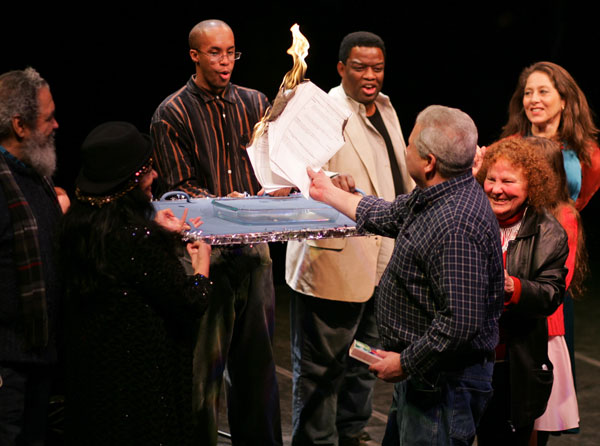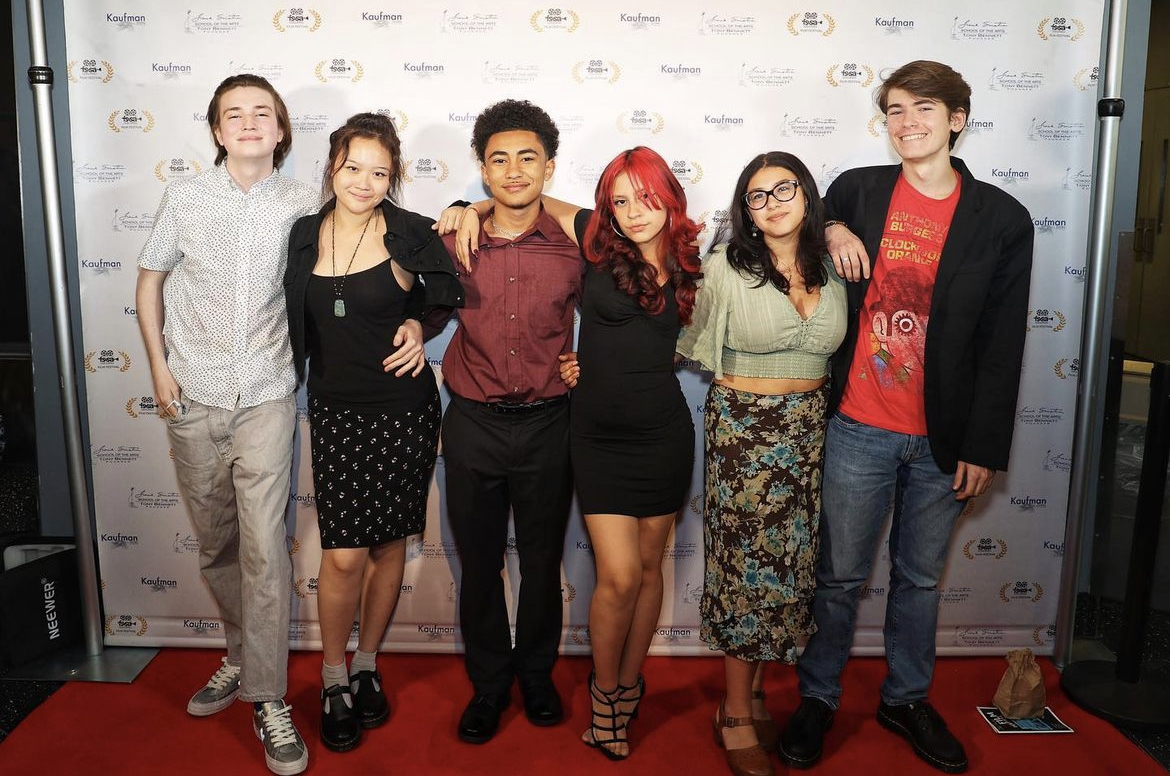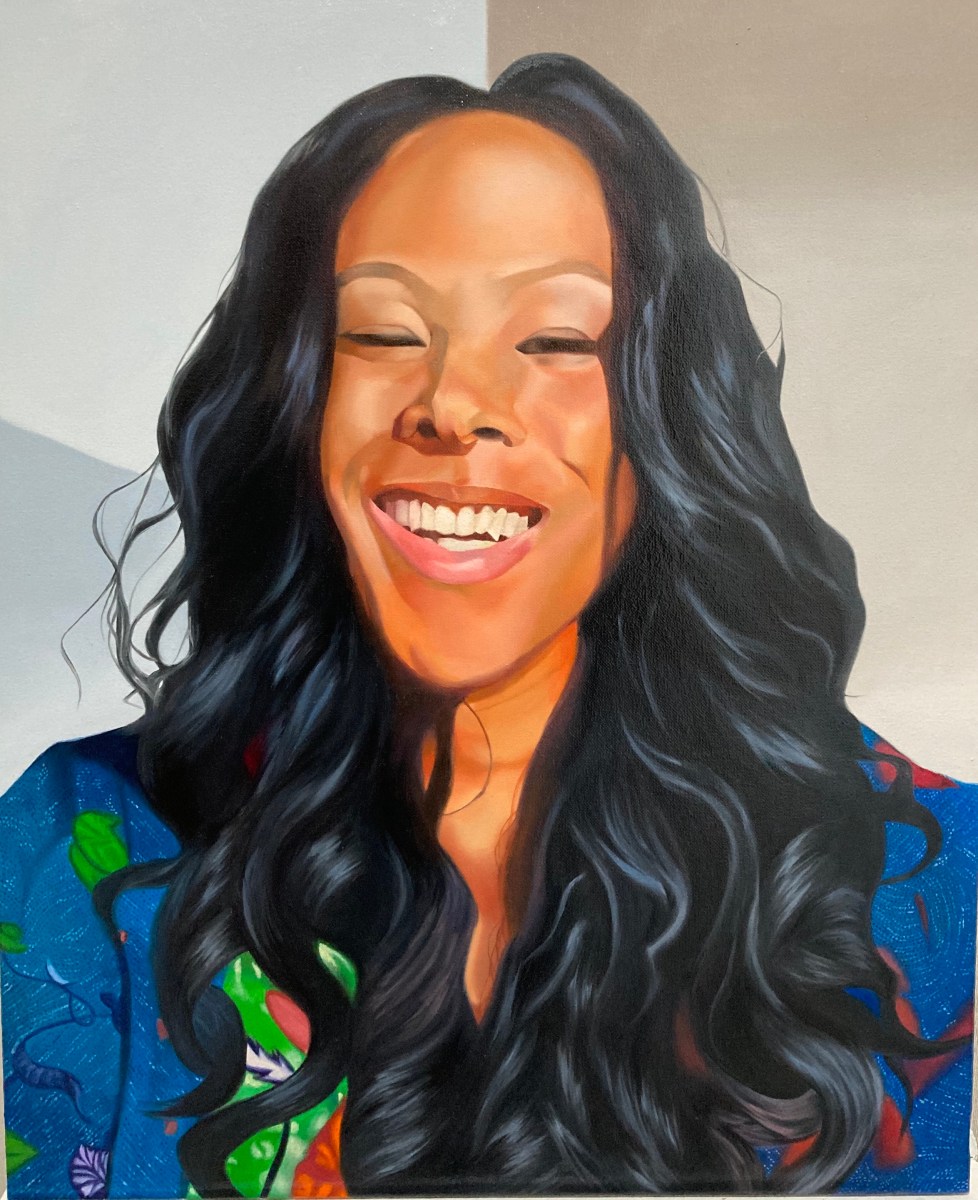
BY LINCOLN ANDERSON | Crystal Field, co-founder and artistic director of Theater for the New City, joined local activists and theater board members in a joyous torching of the theater’s mortgage on Sat., Jan. 26.
The event was a celebration of not only paying off the mortgage on the theater’s space at First Ave. and 10th St., but of the Downtown institution’s four decades of persevering as a leading incubator of the performing arts.
Speaking before the mortgage went up in flames at the end of the evening’s program, Field recounted how T.N.C. had been forced to relocate several times during its history.
“This is our fourth location, so I know all about artists being kicked out of neighborhoods. We started in Westbeth,” she recalled. “I won’t go into it — but we lost our lease there and we moved over to the Jane-West welfare hotel.”
The far West Village back then was a neighborhood of abandoned warehouses. Parked in front of the hotel were trucks inside which hookers turned tricks.
The West Side got more pricey, and T.N.C. next moved to a space on Second Ave. that had once been a top theater but had become a key club and a porno theater.
“And there had been a murder there,” Field noted.
But then the rent there escalated, too, going from $2,500 to $8,000 a month, and again the alternative theater space needed a new location.
They found the former city market building — their current home. Built in 1939 by Mayor LaGuardia to get pushcart vendors off the streets, it was a mess.
“There was three and a half feet of garbage in the basement,” she recalled. “There were cars parked in here. There were old burlap sacks with beans and rice.”
T.N.C. bought the building from the city for $717,000, at fair market value, with a mortgage that has finally been paid off.
“Now it’s zero,” Field told the audience, as they applauded.
She added that the theater’s name came from a speech that Mayor John Lindsay gave.
“He wasn’t a good politician but he was a great mayor,” she said. “And he had in one of his speeches that this would be a new city. And he tried and he tried, he really tried — it wasn’t.”
Councilmember Rosie Mendez and an aide to Borough President Scott Stringer presented proclamations to Field.
Charles Busch, one of the alumni of T.N.C. who went on to stardom after getting his start there, was among the artists who spoke about how important the space had been to their artistic growth.
“I think I am a perfect example of what Theater for the New City has to offer,” he said. “My first play was performed here.”
He noted that first effort, a drama about a pair of incestuous brothers, was “terrible, awful. I was trying to write some sort of ‘Equus’ play. The highlight of the play was I take off all my clothes and I…f— myself.”
But the gender-bending performer kept returning to T.N.C. and kept honing his craft, and went on to success on Off Off Broadway as well as on Broadway, where his “The Tale of the Allergist’s Wife” in 2000 was a hit.
Speaking before the event, Reverend Billy recounted a similar story to The Villager.
“She gave me my first show in 1988,” he said. “It was two little one-acts. It was called ‘The American Yoga.’ It’s about that moment that people relax before a car accident.” It wasn’t exactly a heavenly show, but again, it was a start.
David Amram, 82, with his son Adam Amram on congas, performed a jazzy, scat-filled tribute to Field and the theater, and recounted his collaboration with legendary Beats Jack Kerouac, Allen Ginsberg and Neil Cassady on the score of the 1959 film “Pull My Daisy.”
“In an age of egomania, narcissism and bad taste, we have this beautiful theater that’s still community oriented, where everyone can be creative,” he said. “Small is beautiful and always will be beautiful.”
Westbeth artist Richard West was admiring the old fliers from past performances hung up outside in the theater’s hallway space, including one for his own “Bohemia on Wry,” which was directed by his longtime partner, Lissa Moira, in the 1990s.
“Oh, it’s an incredible history,” he said of all the shows T.N.C. has put on. “It gave people a chance. In these days, you need a lot of money to make it. It used to take two years to get your play put on in this place.”
Some controversy swirled around T.N.C. in the late 1990s when the city sold off air rights above it to allow construction of a 14-story, market-rate, residential condo tower. People thought the theater owned the air rights, which wasn’t the case. But the theater had to O.K. the project and give up 2,000 square feet of its space for it. In exchange, the city restructured their mortgage from a 15- to a 30-year term, and from $6,500 to $2,000 a month, which was critical for the theater.
“It was either that or close,” Field said of the deal, in a follow-up interview this week. “We were in trouble.
“We never owned the air rights and we don’t get any money from the tower,” she said. “We tried to buy the air rights, but they wouldn’t sell them.”

















